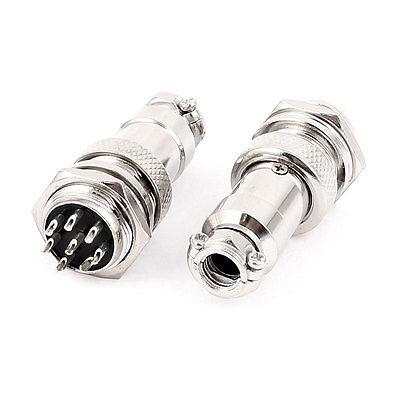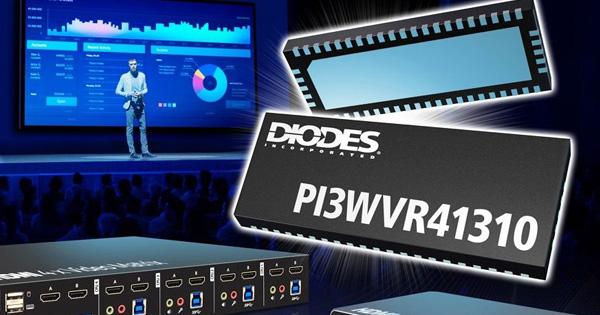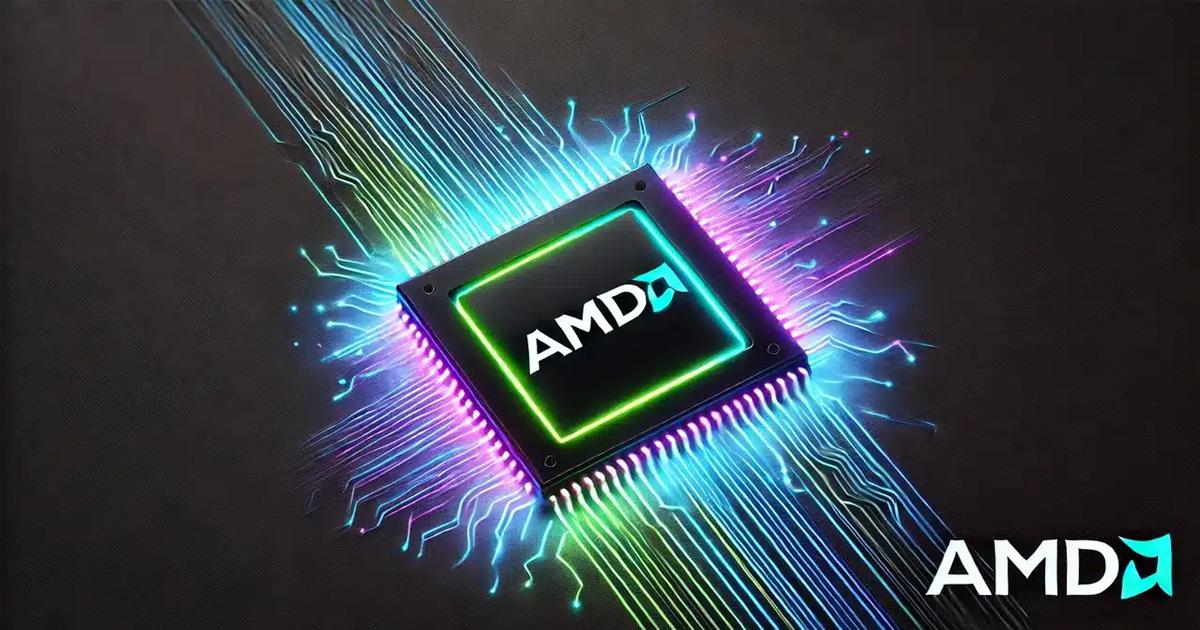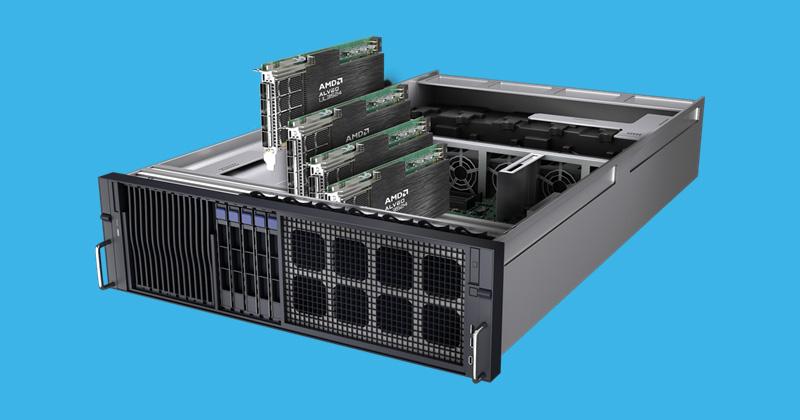
Intel 18A Advanced Packaging is Key to Tech Leadership
Earlier this month, Intel announced that its lead internal products on the Intel 18A process came out of the fab and have powered-on and booted their operating systems. The company indicated its first external customer for 18A will tape out in the first half of next year.
The new head of Intel Foundry Services (IFS), Kevin O’Buckley, who joined in May 2024 after running the ASIC business at Marvell Technology and previously led product and technology development at GlobalFoundries and IBM, said he believed the system-level approach addressing process technology and advanced packaging was key to putting Intel back on the technology leadership map.
In an interview with EE Times, O’Buckley emphasized that the industry cannot just continue to scale by focusing on transistor poly pitch or gate oxide thickness. “It’s now about the whole system, so for me personally, one of the biggest surprises joining Intel from the outside was to get a sense of the differentiation of their advanced packaging technologies and frankly, in many ways, the progress that’s being made in securing customers,” he said. “Five of the top ten biggest advanced packaging customers in our industry are engaging with us, using Intel Foundry team as a partner. And by that, I mean we have design wins with them.”

O’Buckley added that Intel Foundry was accelerating investment in scaling its advanced packaging capacity to enable these customers. “So, that’s the incredible part. I call it kind of the tip of the spear for growing our business. And now, I think having 18A available and scaled as a world class technology is such an incredible milestone.”
“But customers also need to trust us as a foundry supplier right before they’re willing to bet business and advanced packaging is actually a wonderful way for us to demonstrate that to customers in a very quick turnaround time,” he added.
So, what was the announcement related to Intel 18A, and what else does this mean for both Intel and the industry?
Find out more from the full interview below:
Kevin O’Buckley: Today, we’re announcing three major milestones for us as an Intel Foundry team on our path to execute the five nodes in four years roadmap that we lined up to restore Intel Foundry as a leader in silicon foundry capabilities for our customers.
All of them are based on our 18A technology, which for us is the vehicle where we can confidently say we have leadership technology from a power performance area (PPA) standpoint. And now also for the first time as an Intel Foundry team, full enablement for external customers, meaning companies that are not Intel [can] develop their products on that platform.
First and foremost, our lead products on Intel 18A, the Panther Lake product AI PC client processor and Clearwater Forest server processor, have both taped out earlier this year and now have product in their labs in the validation cycle. They’ve successfully booted their operating systems, Windows and Linux respectively. Now running on those operating systems, this is an incredible maturity milestone for us as an Intel foundry team for 18A.
The second milestone is the release of our PDK1.0 to our ecosystem customers and partners—companies like Synopsys, Cadence, Siemens and Ansys, who are developing IP and certifying EDA tools for both internal Intel and external customers on the use of the Intel 18A technology.
And finally, our third milestone that that we’re announcing is that our progress with external customers in 18A is proceeding on pace—we have it well in execution, a design that will now be taping out that we can say publicly will be taping out during the first half of calendar 2025 next year.
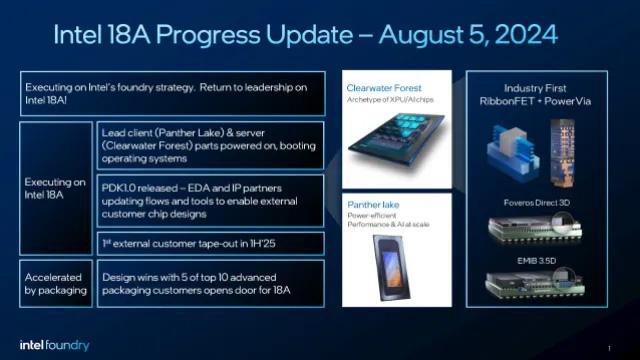
Nitin Dahad: Having come from outside Intel in the last couple of months, what, in your experience of coming into Intel Foundry, surprised you the most?
Kevin O’Buckley: To be joining Intel and IFS right as we are approaching the finish line for this transformation journey is incredibly exciting, [referring to the five nodes in four years roadmap]. Because it’s now the opportunity for us to go from discussions of road maps and “trust us” to, “Hey, here’s the data.” Silicon speaks, right?
So, I’ve been thrilled at the timing, the maturity of the progress that the team has made as we really continue to launch this business.
I think the second one I would say that’s been a genuine surprise to me is complementing things like 18A and our semiconductor technology. Intel has been describing its vision as a system foundry, and I have been thrilled to get a deeper understanding of both the technology differentiation and the capacity that’s in place at Intel for advanced packaging customers.
We have technologies like EMIB and Foveros, wafer bonding and chip bonding technologies that really are some of the best in the industry, and we’re operating at a scale that already is an X Factor of anyone else in the industry in advanced packaging supporting the historical Intel products roadmap and going forward—a substantial number of external customers in advanced packaging.
In fact, we have design wins with five of the top 10 advanced packaging customers in the semiconductor industry and that’s a wonderful opportunity from a business standpoint, obviously to drive growth in the business. But just as importantly, and maybe more importantly, strategically, to develop a trusting relationship as a supplier with these critical customers.
Nitin Dahad: One of the key messages when you did the IFS launch that I attended earlier this year was about being open to both Intel and non-Intel customers. Do you feel that having reached this milestone of having five out of 10 top customers on the packaging side is a significant demonstration of that and validation of that?
The second part of the question is, how do you see this in the context of industry discussion about advanced packaging, 3D-ICs and progress on heterogenous architectures?
Kevin O’Buckley: First, I think it’s existential for us that one of the most important pieces of capital we need as an Intel Foundry team is advanced technologies. And my message today is, “Hey, we have those advanced technologies, 18A has made incredible progress, the ecosystem is now well developed, and we have incredible advanced packaging technologies.”
The complementary capital we need to be successful in this business is customers that trust us. So, developing that trust with customers means we need a vehicle to do that. It’s not PowerPoint slides. It’s not even presentations like this or discussions like this where we’re talking about silicon results. They need to exercise us as a supplier in a way that gives them confidence that they’re getting priority, that they’re getting incredible customer support, and that they’re delivering [to customers] with confidence as we commit supply to them.
So advanced packaging is actually a wonderful way for us to do that, utilizing an area that we have incredible technological differentiation.
The last point I’ll make to the core of your question is advanced packaging is extraordinarily important as we look forward and you look at the bill of materials or the cost buildup of some of these most advanced AI products in the industry, like fully 50 plus percent of them [are] now packaging content and packaging, which by the way includes silicon, interposers and so on. It includes memory stacks and HBM and the base die that enables all this connectivity, so the value and the impact of these advanced packaging technologies as a complement to, “Hey, just shrink the transistor and get a thinner gate oxide and do something cool in the back end to reduce our cost” is becoming extraordinarily critical.
Nitin Dahad: You talked about expecting the first external customer tape out in the first half of 2025. This clearly was before you joined, but what was it that Intel had that won this external customer? What was important to that customer?
Kevin O’Buckley: For this particular application, we’ve described publicly a sort of triangle, if you will, or a pyramid of foundry starting with semiconductor technologies, base technologies; in the middle, what I would call sustainable manufacturing or our ability to manufacture at scale; and at the top, the advanced packaging enablement for this particular application.
It touches all three but is mostly in the bottom half of the pyramid. This customer is a customer that really wanted to use 18A to get it [to] take advantage of the latest things like our RibbonFET gate-all- around transistor technology and our backside power delivery PowerVia technologies. Plus, they wanted a clear path to be able to manufacture this product in a global footprint that they were confident could meet their needs in the years going forward.
So, in summary, at the top of their requirements list was really related to supply constraints and the geography of where that capacity is available, along with technology differentiation.
And at the advanced nodes, all of our planed manufacturing capacity for 18A that we’ve described publicly right now will be here in the United States. Starting in Arizona and then also transitioning to our Ohio manufacturing projects.
Nitin Dahad: Finally, in the context of some of the corporate announcements we’ve heard from Intel in the last few weeks, what’s your message about your announcements here related to progress with 18A?
Kevin O’Buckley: I think that the most critical top line from my perspective for this, Nitin, is to describe this as a page-turn for our Intel Foundry business going from a team that’s describing an incredible effort to execute a road map, to a team that is now in execution of the last phase of that road map with our 18A technology. Which is sort of the finish line that we’ve always described as restoring Intel’s foundry technologies to world class competitiveness at world class scale.
Nitin Dahad: Well, Kevin, thank you.

